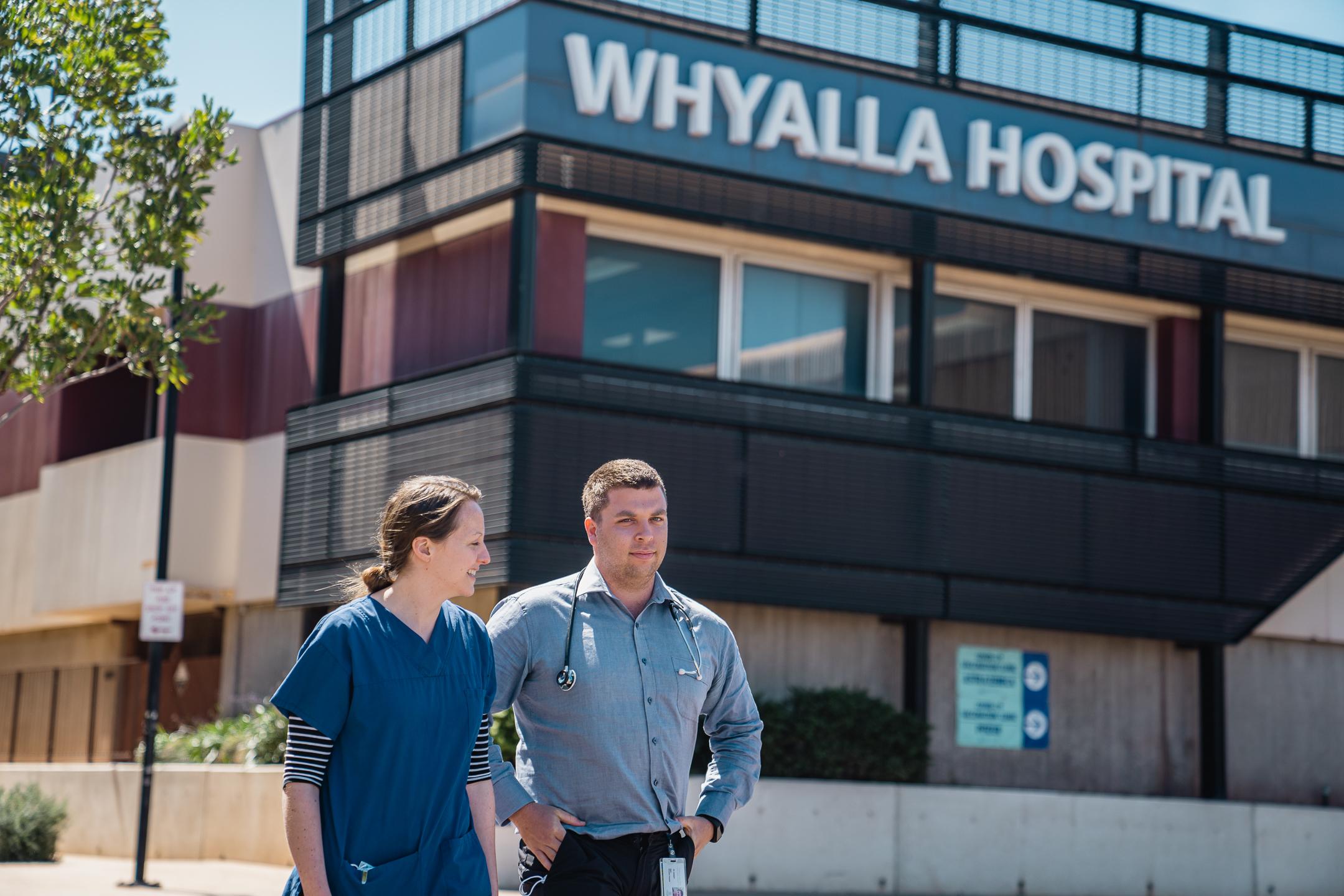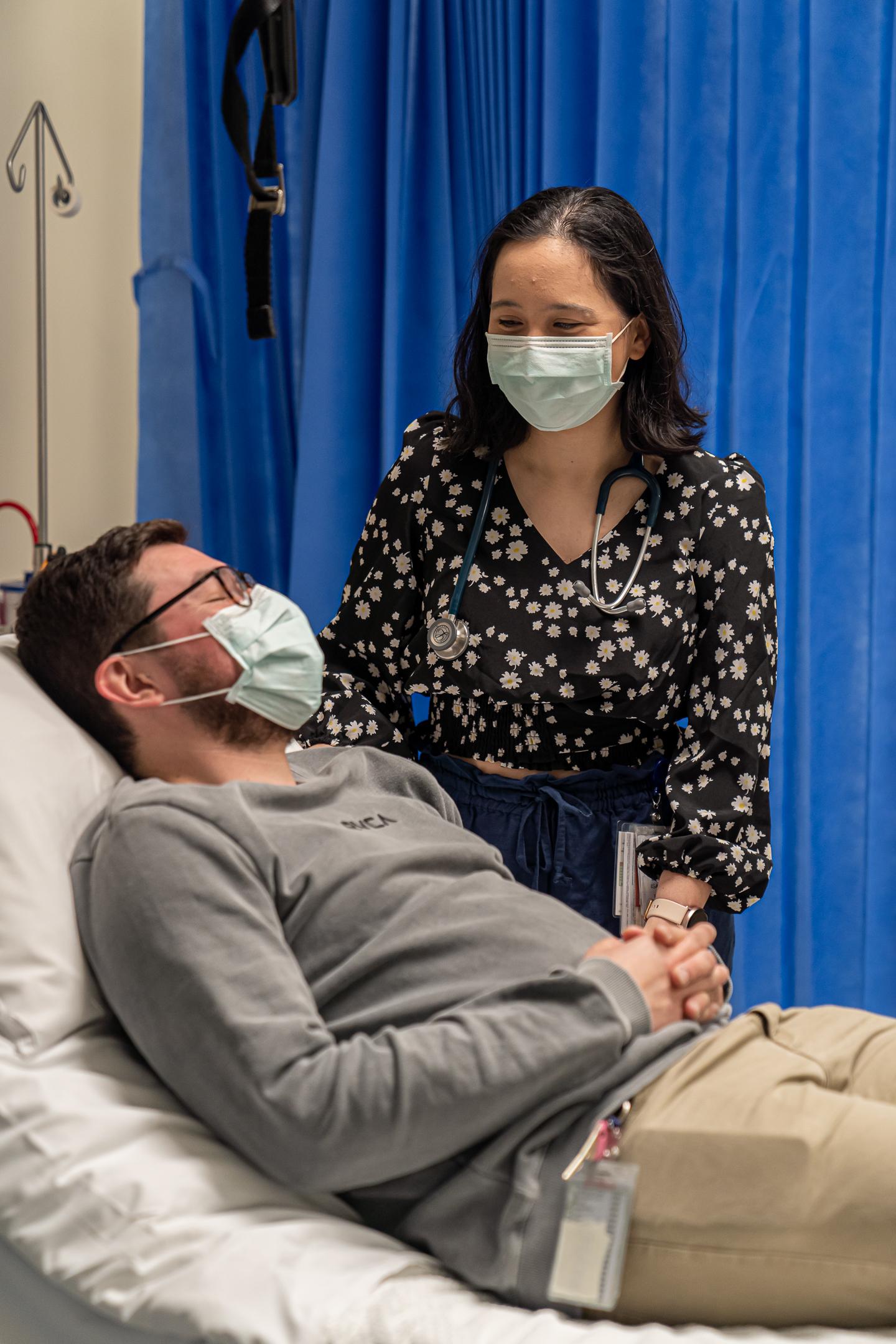Dr Lauren Christian and Dr Joseph Snyder outside Whyalla Hospital & Health Service
Dedicated rural generalist training networks
High quality fit for purpose rural generalist training programs support the establishment and maintenance of both a strong primary and secondary health care system that will provide better population health and distribution (equity) and improved economy in the use of resources.
Communities will realise
- Enhanced viability of rural general practice that supports the delivery of local hospital services
- Improved attractiveness of rural career pathways that are visible, recognised, and valued which increase attraction of a skilled workforce
- Improved business models for specialised services that rural generalists provide
- Improved quality and range of medical services provided locally to meet community need
- Improved connection between primary care and secondary care
Regional local health networks will realise
- A stronger primary care system prevents illness and maintains good health, reducing the burden on hospitals and other medical resources
- An increase in supply of rural generalists to meet workforce and community needs
- Improvements in team and individual workloads, leading to better job satisfaction assisting in attraction and retention of doctors to rural areas
- Improved clinical leadership capability and overall coordination of regional health services
- Improved overall health system performance and population health including:
- Improved consumer-centred care
- Improved health system functioning across the continuum of care
- Improved efficiency of care
Dr Isabelle Gill treating a patient at Southern Fleurieu Health Service
End to end training networks
South Australia has a defined Local Health Network (LHN) structure, each with a range of geographical, demographical and population variables. Each LHN also has varying capacity to train junior doctors across the different stages of training.
An end to end training network considers the above variables and provides training structures for the key stages of rural generalist training allowing trainees to live, train and work in a particular geographical area. Training networks may not directly align to a particular LHN but may utilise training capacity across LHN boundaries. This will enable trainees to establish links with the Community while they are training and enable better transition to the local workforce post training.
Training structures are the mechanism that allows medical trainees to complete the key stages of training (the pathway to fellowship) regardless of the fellowship they are training towards. These structures provide definition to trainees on how they can navigate their training from start to finish.
Below are some of the examples of existing training structures in SA:
- Internship – a Medical Board of Australia defined structure enabling interns to complete requirements for general registration.
- General Training – a rotational structure where PGY2+ trainees gain a general clinical experience prior to applying and entering a specialty training program. This is also currently the first stage of Rural Generalist training.
- Surgical RMO – a structure that trainees who wish to pursue a career in surgery must undertake which includes purely surgical rotations. This enables them to complete their JDocs requirements.
- Paediatrics RMO – a structure that trainees who wish to pursue a career in Paediatrics to work purely across Paediatrics gaining specific experience to assist/enable them to enter Paediatrics training.
See where you can access rural medical training in South Australia
The Rural Generalist Program South Australia’s interactive map shows the training sites across South Australia where training opportunities exist. Each site may have multiple training opportunities or rotations across the different training levels.
Expanding training options
SA will soon have all six Regional Local Health Networks providing junior doctor medical training. The established training networks, Limestone Coast LHN, Flinders Upper North LHN, Eyre and Far North LHN and Riverland Mallee Coorong Local Health Network’s Riverland Academy of Clinical Excellence, are being joined by Barossa Hills Fleurieu LHN’s Collaborative for Education and Training (B-CET) commencing training in 2024 and Yorke and Northern LHN in 2025.
These networks offer in a geographically co-located area internship, general training and primary care training structures as well as an increasing availability of advanced skill training opportunities.
The video (left) – Life in rural South Australia with Flinders University Rural Training Pathway for Medicine offers a snap shot of rural training across Riverland Mallee Coorong, Barossa Hills Fleurieu and Limestone Coast through Flinders University Rural and Remote Health SA. Or visit the University of Adelaide’s Rural Clinical School if you would like to consider rural training across the Eyre and Northern regions of South Australia.
Flinders University Rural and Remote Health SA
Adelaide University Rural Clinical School
Where would you like to train?
You can also learn more about our regional local health networks through the Working in regional South Australia site.





